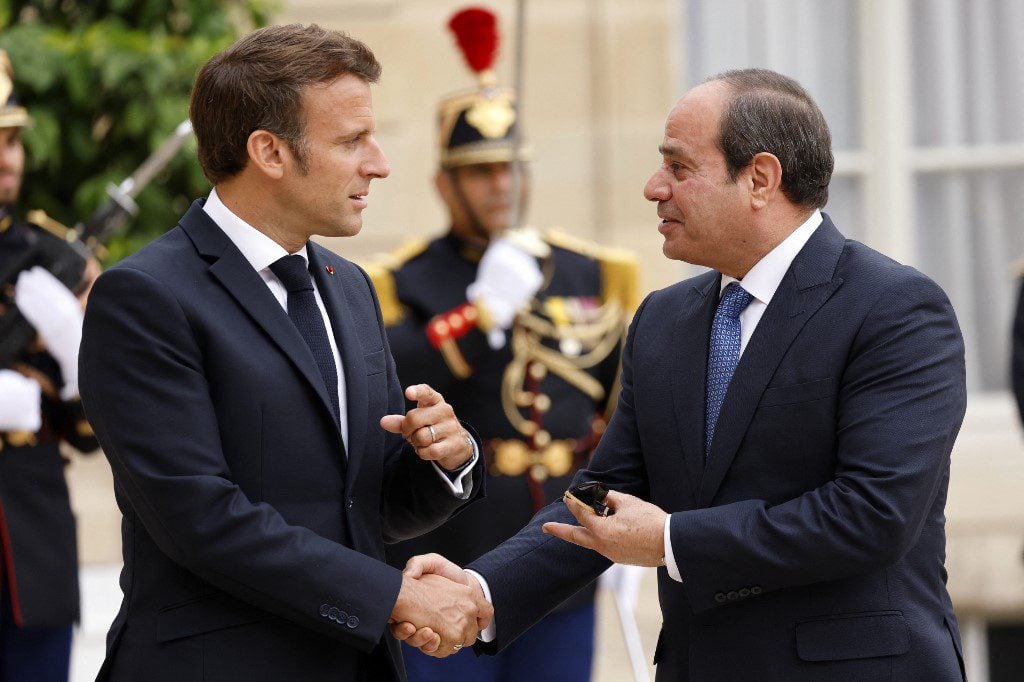
Justin Salhani
Egyptian President Abdel Fattah el Sisi visited Paris in July in an effort to strengthen security ties with French president Emmanuel Macron. In a meeting that drew criticism from human rights workers and activists, the two heads of state showed how arms sales and access to reasonably priced fossil fuels have taken precedence for Macron over human rights or freedoms in the region.
“As part of the dialogue of confidence between France and Egypt, they also addressed the issue of human rights,” the Elysee said in a lukewarm nod to concerns raised by human rights advocates.
As Sisi and Macron chatted in Paris’ Elysee Palace, an estimated 60,000 political prisoners are currently languishing in Egyptian jails. Among the imprisoned in Egypt is Alaa Abdel Fattah, an Egyptian-British writer, and activist, who has been on hunger strike since April.
“Today once again we have no proof that Alaa is alive, we have no understanding of his mental and physical health. Alaa is in the black box that is @AlsisiOfficial’s prison system. We really don’t know what to be done,” Alaa’s sister, Mona Seif tweeted.
When Macron first came to office in 2017, he spoke of a foreign policy guided by human rights. But since then, Macron has strengthened relationships with various autocrats from the Arab world.
In December 2020, Macron presented Sisi with the Grand Cross of the Legion of Honour – France’s highest award – in a move that angered pro-democracy and human rights workers.
The suffering of activists and others arbitrarily arrested has been of little focus to Macron. That includes Ramy Shaath, a Palestinian-Egyptian activist, who recently renounced his Egyptian citizenship so that he could be released to join his wife in France.
Macron also met with UAE ruler Mohammed Bin Zayed Al Nahyan, more commonly known as MBZ, in July 2022. Freedom House rates the UAE as not free with low scores on both political rights and civil liberties. While the UAE uses soft power to portray itself as a liberal and tolerant nation, many rights including freedom of expression are severely monitored and complemented with arbitrary arrests, abuses, and deportations. But that didn’t stop an $18 billion arms deal between France and the UAE in December 2021 or Macron bestowing MBZ with the same award he gave Sisi.
Lebanon, rated as partly free by Freedom House, does not suffer from the same levels of oppression as Egypt or the UAE. But Macron has still engaged a corrupt political class that has thrown the country into one of the worst economic crises since the mid-19th century instead of any of the reform or revolution figures in the nation. The focus appears to be on a false semblance of stability or at least a continuation of the status quo rather than supporting grassroots-driven change. Even if that status quo is deadly for many living in Lebanon.
But Macron is not the only Western figure undermining the fight for dignity and freedom in the Middle East. American President Joe Biden recently went on a widely publicized Middle East tour to Israel and Saudi Arabia. Biden claimed the tour’s focus was on regional security. But his agenda showed otherwise.
In Israel, Biden declared himself a Zionist in a slap to the Palestinian people suffering under a system of apartheid. Biden then met with the Palestinian Authority – a group many Palestinians view as increasingly corrupt and useless – in an effort to improve relations damaged under Biden’s predecessor. Biden did however call for a transparent investigation into the murder of Palestinian-American journalist Shireen Abu Akleh.
He also gave an infamous fist bump to Mohammed Bin Salman, commonly known as MBS, in the first meeting between the two leaders. Biden had previously claimed, much like Macron, that he would focus on human rights and therefore isolate Saudi Arabia as a pariah state. The White House said that Biden addressed human rights, including the murder of Saudi journalist and American resident Jamal Khashoggi, with MBS.
But just hours after Biden’s visit Israel launched a new attack on Gaza.
Meanwhile, Egypt is set to host the COP 27 climate summit in September in Sharm El Sheikh. An autocratic state with strong ties to other autocratic, fossil fuel producing states does not bode well for the future of the changing climate nor freedom in the region.
Unfortunately, arms sales and energy prices will see Western leaders backtracking on values that the West claims to uphold. That is largely because many citizens in those countries care more about purchasing power and fuel prices than the rights of people suffering under autocratic regimes in places like Egypt, Saudi Arabia and the United Arab Emirates.
This is the other side of a world being hooked on fossil fuels. As long as Europe and the United States rely heavily on gas and oil, and particularly on autocratic regimes to provide it at reasonable prices, the people of the regime will continue to suffer.
DISCLAIMER
The opinions expressed in this publication are those of our writers. They do not purport to reflect the opinions or views of Fanack or its Board of Editors.


